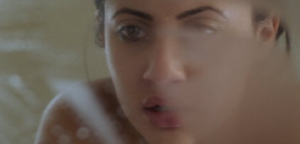Writer/Director’s Inspiration
“Lorsque rien n’existait, l’amour existait ;
et lorsqu’il ne restera plus rien, l’amour restera ;
il est le premier et le dernier.”
“When nothing existed, love existed;
and when nothing shall remain, love shall remain;
it is the first and the last.”
– Princess Shéhérazade, One Thousand and One Nights.
Genesis
Early 1990’s I was living in Paris studying ‘Langue et Civilisation Françaises’ at Sorbonne University. While browsing books in a small bookshop on the left bank, I bought “Schéhérazade ou l’éducation d’un roi” (Sheherazade or the education of a King) a book by Marie Lahy-Hollebecque** see reference at bottom. From this book, I saved the above quote, which on screen starts and sets the central theme of the movie Beyond Paradise.
A dual U.K. and U.S. citizen but of mixed Middle Eastern descent, I’ve spent most of my life in exile – away from motherland and family – studying, living, and working in London, San Francisco, Rio, Los Angeles, New York and Paris.
I’m drawn to the stories of displaced people, the plight of the voiceless and marginalized minorities of the world, especially women, children, and gays and lesbians. The human being’s most powerful and mysterious feeling of “falling in love” intrigues me. I’m attracted to cross-cultural love stories involving conflict, aiming for a greater understanding and appreciation of diverse cultures.
 Shahrzad (Francia Raisa) Tehran flashback
Shahrzad (Francia Raisa) Tehran flashback
Beyond Paradise may be the first movie about the lives of certain Iranian immigrants uprooted from their homeland and displaced to California. In particular, the film is about the tragic consequences of violent abuse of a young classical music student, Shahrzad, who flees Iran to marry an Iranian in Los Angeles, but then Qismet (Destiny) leads her to fall in love with Sebastian, a Spanish-American man.
Perhaps as a therapy against her past tragedy, Shahrzad becomes an avid reader of Rumi, the 13th C. Persian poet. Rumi’s ecstatic poetry is naturally used in the film, a bit similar to the use of Neruda’s poems in the Italian movie Il Postino. Set in Los Angeles, Beyond Paradise is mostly in the English language. (Hopefully this may help to introduce Rumi’s sublime love poems and the tragic repercussions of ‘Violence Against Women’, to a wider international audience.)... More
